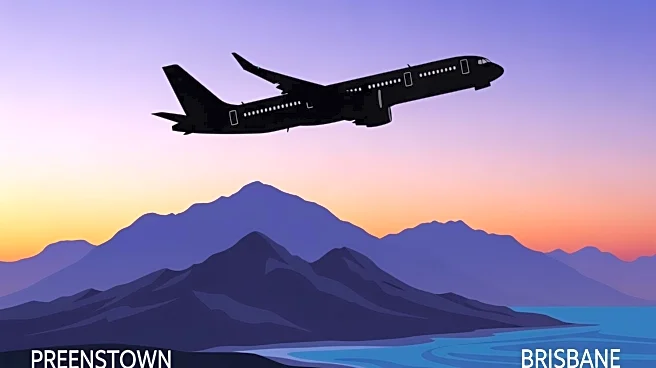What's Happening?
Air New Zealand has announced a new non-stop seasonal service connecting Queenstown and Brisbane, set to launch on June 22, 2026, and operate three times a week until October 23, 2026. The service will be conducted using Air New Zealand's A320neo aircraft,
offering over 17,000 seats between the Southern Alps and Queensland. This new route aims to enhance travel opportunities for both Australians and New Zealanders, providing direct access to popular destinations during the ski and adventure season. The service is expected to strengthen ties between the communities on both sides of the Tasman Sea, offering greater flexibility and choice for travelers.
Why It's Important?
The introduction of this seasonal service underscores Air New Zealand's commitment to expanding its trans-Tasman network, facilitating increased tourism and economic exchange between New Zealand and Australia. By providing direct flights, the airline is enhancing accessibility to Queenstown's renowned ski resorts and adventure activities, potentially boosting local tourism and related industries. For Queenslanders, the service offers a convenient escape to the scenic landscapes of New Zealand's South Island, while South Islanders gain easy access to Brisbane's sunny climate. This development is likely to stimulate travel demand and contribute to the economic vitality of both regions.
What's Next?
As the launch date approaches, Air New Zealand is offering promotional fares to encourage bookings and raise awareness of the new service. Travelers can book flights from Queenstown to Brisbane at discounted rates, with the sale ending on November 18, 2025. The airline's strategic expansion may prompt other carriers to explore similar routes, potentially increasing competition and options for passengers. Additionally, the success of this seasonal service could lead to further route expansions or increased frequency, depending on demand and operational feasibility.
Beyond the Headlines
The new service highlights the importance of strategic airline partnerships and route planning in enhancing connectivity and tourism. It also reflects broader trends in the aviation industry, where airlines are increasingly focusing on niche markets and seasonal services to optimize capacity and meet consumer demand. The initiative may also have environmental implications, as increased air travel contributes to carbon emissions, prompting discussions on sustainable practices within the industry.















